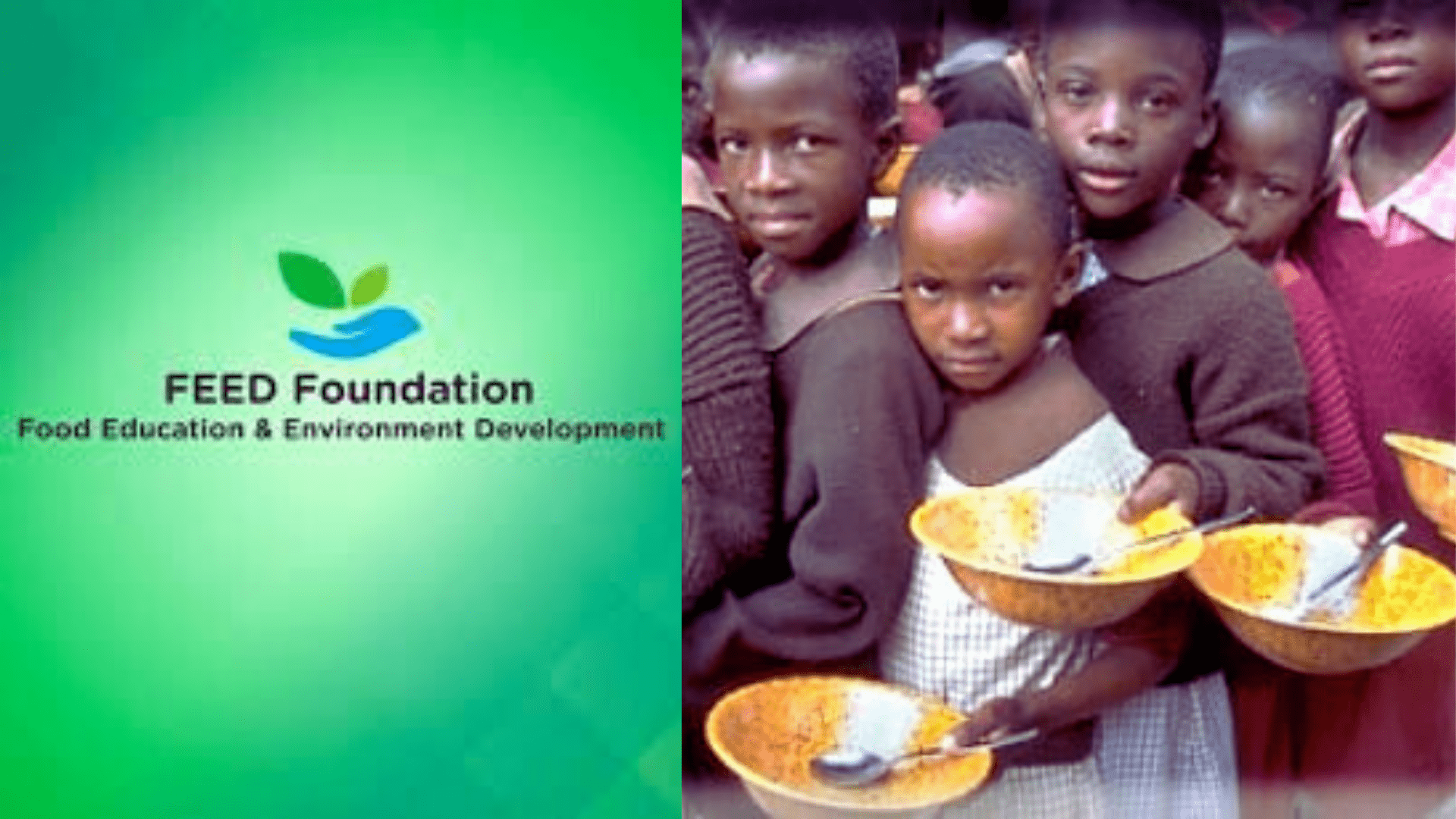The FEED Foundation is a nonprofit organization dedicated to ending global hunger and ensuring access to nutritious food as a fundamental human right. It supports initiatives and partners that work effectively to combat hunger in various parts of the world.
Key aspects of the FEED Foundation’s mission include:
- Human Rights Perspective: The organization strongly believes that everyone deserves to be well-fed, regardless of their socio-economic background.
- Global Reach: It organizes relief efforts to address hunger on every continent, demonstrating a comprehensive approach to this global issue.
- Tangible Impact: Through its retail partnerships, the FEED Foundation helps fund meals and food supplies for those in need. Each product sold has a specific impact, such as providing school meals or fortified foods, which is quantified and communicated to consumers.
The FEED Foundation’s approach not only focuses on immediate food relief but also aims to promote a sustainable and equitable food system that can prevent food insecurity in the long term.
Background of FEED

The FEED Foundation was established in 2008 by Lauren Bush Lauren as an expansion of the philanthropic efforts of her lifestyle brand, FEED Projects. FEED Projects itself was co-founded by Lauren Bush Lauren and Ellen Gustafson in 2007, in partnership with the United Nations World Food Programme. The initial concept was to create products that would engage people directly in the fight against global hunger through tangible means. Each product sold under the FEED brand carries a number indicating the amount of donations triggered by the purchase, aimed directly at combating childhood and global hunger.
The FEED Foundation’s specific focus has been on supporting global food systems that ensure food security for all, particularly in addressing challenges that vulnerable populations face daily across various continents.
The Mission of FEED
The FEED Foundation focuses on tackling global hunger and improving food security through sustainable and direct interventions. Its activities are structured around supporting and expanding networks that aid in food distribution to vulnerable populations. One of its specific projects involves the expansion of the Rethink network, aimed at integrating food systems into schools to nourish the next generation. By directly addressing the needs for healthy meals, particularly for young children in developing regions, FEED emphasizes the vital role of nutrition in mental and physical development. This approach not only combats hunger but also promotes education and overall well-being, essential for long-term societal growth and stability.
Key Initiatives
Sustainable Development Goals
FEED’s initiatives align closely with the Sustainable Development Goals (SDGs), particularly with Goal 2: Zero Hunger. This goal aims to end hunger, achieve food security, improve nutrition, and promote sustainable agriculture by 2030. FEED’s work in expanding food system networks directly supports this objective by improving the efficiency and reach of food distribution, especially to vulnerable populations. Additionally, the foundation’s commitment to integrating food systems into educational settings not only tackles hunger but also enhances nutritional education, thereby supporting broader SDGs related to good health and quality education. FEED’s efforts contribute to a multi-faceted approach, promoting partnerships and integrating innovations in food systems that are essential for sustainable development.
Project Examples
The FEED Foundation has been instrumental in several impactful projects aimed at combating hunger and enhancing food security worldwide. Some of their significant projects include:
- Nutritional Support through Breadfruit Trees: In collaboration with the Trees That Feed Foundation, FEED has expanded its programs to 17 countries by providing breadfruit trees. These trees are highly nutritious and help address food insecurity while also creating income stability for communities.
- Community Food Drives and Meal Delivery: FEED supports local initiatives such as community food drives to replenish food pantries and volunteer programs that deliver prepared meals to the elderly and disabled, thereby enhancing the daily survival and nutritional intake of vulnerable populations.
These projects reflect FEED’s commitment to not just addressing immediate hunger needs but also building long-term sustainability and self-sufficiency in food production.
Impact of FEED
The FEED Foundation has shown a significant impact through its various projects aimed at alleviating hunger and promoting sustainability. Here are key measurable outcomes and success stories:
- Broad Program Reach: FEED works globally, engaging innovators at the nexus of food, education, and agriculture. Their impact spans across various aspects such as politics, nutrition, and finance, highlighting their comprehensive approach to solving hunger and improving food systems.
- Outcome-Based Funding Model: FEED utilizes an outcome-based funding model which underscores the use of evidence-based practices. This model ensures that their initiatives are continuously refined based on their effectiveness, ensuring resources are used efficiently to maximize social impact.
- Impact Assessment: While specific measurable outcomes from individual programs are not detailed, the foundation’s approach includes assessing the philanthropic impact, which often includes looking at tangible outcomes and their difficulties in measurement. This rigorous assessment underpins FEED’s strategy to adapt and enhance its interventions.
These points reflect FEED’s commitment to not only addressing immediate needs but also creating sustainable solutions that have a lasting impact on communities worldwide.
Partnerships and Collaboration
FEED Foundation’s effectiveness in combating global hunger and enhancing food sustainability is significantly amplified through strategic partnerships and collaborations:
- Collaboration in Animal Nutrition: FEED’s engagement in sustainable solutions for food systems emphasizes the role of feed and animal nutrition. This approach positions them to leverage agricultural innovations to address food shortages sustainably.
- Cross-Sector Partnerships: The foundation fosters cross-sector partnerships, emphasizing collective impact and innovation in tackling social challenges. This strategy ensures that diverse expertise and resources are pooled together, enhancing the development and implementation of innovative solutions.
- Broad Collaborative Networks: FEED collaborates within and beyond the organization, partnering with other entities to expand its reach and impact. This includes everything from food donations to promoting equity in production, showcasing a holistic approach to addressing food security issues.
These partnerships not only expand FEED’s operational capabilities but also deepen its impact across various communities and sectors, driving forward its mission to eradicate hunger and improve global food systems.
How FEED Works
Fundraising Strategies
While the specific fundraising strategies of the FEED Foundation aren’t detailed in the search results, several common nonprofit fundraising strategies likely utilized by FEED can be inferred from general practices:
- Diverse Fundraising Campaigns: FEED may use a variety of campaigns, including peer-to-peer and online fundraising, which are popular among nonprofits for their broad reach and engagement potential.
- Donor Acquisition Strategies: Effective donor acquisition is crucial. FEED might employ targeted strategies to identify and attract new supporters, which could include digital marketing and personalized outreach to potential donors.
- Comprehensive Fundraising Strategies: Broad strategies that encompass recruiting new supporters and optimizing engagement and donations through multiple channels are likely part of FEED’s approach. This holistic view ensures sustained support and growth.
These strategies, tailored to the mission and specific goals of the FEED Foundation, help in effectively generating the necessary funding and resources to carry out their projects.
Allocation of Funds
The FEED Foundation allocates its funds primarily towards programs and initiatives aimed at fighting hunger and improving conditions in marginalized communities. Key points on how funds are distributed and used include:
- Direct Project Funding: The foundation provides grants to support specific projects, such as the introduction of fuel-efficient stoves in schools in Zambia’s Eastern Province. These projects focus on education and nourishment for marginalized children.
- Grants Allocation: Financial statements reveal specific figures such as expenses including grants. For example, in one fiscal year, they recorded expenses of $195,335, with $170,442 allocated directly to grants.
- Efficiency and Donation Maximization: The foundation strives to keep organizational expenses low to maximize the amount donated to effective organizations working on their cause. This commitment is evident from their financial oversight and public disclosure of financials.
These strategies illustrate the FEED Foundation’s dedication to the effective and targeted use of funds to achieve their mission of alleviating hunger and poverty.
Criticisms and Challenges
The FEED Foundation has faced several criticisms and operational challenges, which are notable in understanding its impact and operational transparency:
- Public Perception and Trust Issues: The foundation has received negative online comments, which could reflect concerns about its operational methods or impact. These criticisms could affect public trust and donor confidence.
- Miscommunication and Spam Calls: There have been issues related to spam calls falsely attributed to the FEED Foundation. The organization has clarified that it never solicits funds via phone calls and is investigating these spam claims. This situation points to potential challenges in managing their public image and addressing the misuse of their name.
These challenges underscore the importance of clear communication strategies and maintaining transparency to build and retain trust among supporters and the general public.
How to Get Involved
Individuals and organizations can engage with the FEED Foundation through various means to support its mission of creating a sustainable and equitable food system:
- Funding and Grants: Engage by supporting the funding of innovative projects at the intersection of food, politics, education, nutrition, and agriculture. Organizations can become grantors or partners in specific projects aimed at enhancing food security and sustainability.
- Scientific and Technical Capacity Building: Participate in building the capacity of local and regional conservation organizations. This could be through direct involvement or supporting training programs that promote local, regional, and international partnerships.
- Advocacy and Policy Support: Work with the foundation to advocate for policies that advance food security and equitable food distribution. This includes engaging in dialogues, policy-making processes, and public advocacy to drive long-term solutions to hunger and food insecurity.
Future of FEED
The FEED Foundation continues to position itself at the forefront of addressing global food security challenges by focusing on several strategic initiatives:
- Empowering Innovators: The foundation supports US-based and international grantees who are innovators in the fields of food, politics, education, nutrition, finance, and agriculture. This approach fosters future-thinking solutions that tackle the systemic issues in these interconnected sectors.
- Cross-Sector Partnerships: Upcoming initiatives likely include an emphasis on creating and enhancing cross-sector partnerships. These collaborations are crucial for scaling effective solutions and integrating various perspectives and expertise in the fight against hunger and poverty.
- Sustainable Development Goals: Aligning with global objectives, the FEED Foundation is set to continue its work towards sustainable development goals, particularly those related to ending hunger, achieving food security, and promoting sustainable agriculture.
These initiatives demonstrate the foundation’s commitment to not only addressing immediate needs but also ensuring long-term sustainability and resilience in food systems worldwide.
Conclusion
The FEED Foundation focuses on tackling global challenges at the intersection of food, education, agriculture, and nutrition. It supports US-based and international innovators who are forward-thinking in these critical areas, aiming to make a substantial impact on food systems and related issues. The foundation’s initiatives are crucial for promoting sustainable agriculture, improving nutritional outcomes, and enhancing food security across various populations. By funding projects that address these interconnected issues, the FEED Foundation plays a vital role in shaping solutions that are both innovative and sustainable, thus contributing significantly to the global fight against hunger and poverty while advocating for healthier, more resilient food systems.
Read also: What Does Passover Mean?





Amazing beutafull. Nice. information